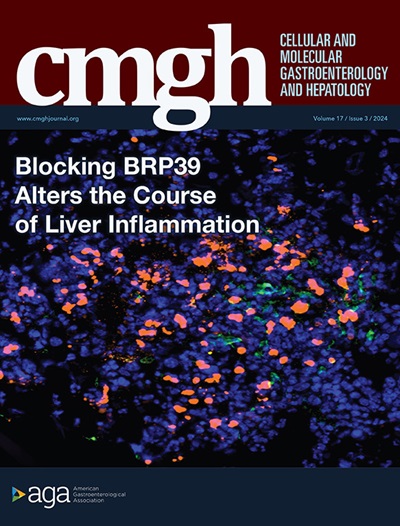PKMζ, a Brain-specific PKCζ Isoform, is Required for Glycolysis and Myofibroblastic Activation of Hepatic Stellate Cells
IF 7.1
1区 医学
Q1 GASTROENTEROLOGY & HEPATOLOGY
Cellular and Molecular Gastroenterology and Hepatology
Pub Date : 2025-01-01
DOI:10.1016/j.jcmgh.2024.101429
引用次数: 0
Abstract
Background & Aims
Transforming growth factor (TGF)β1 induces plasma membrane (PM) accumulation of glucose transporter 1 (Glut1) required for glycolysis of hepatic stellate cells (HSCs) and HSC activation. This study aimed to understand how Glut1 is anchored/docked onto the PM of HSCs.
Methods
HSC expression of protein kinase M zeta isoform (PKMζ) was detected by reverse transcription polymerase chain reaction (RT-PCR), Western blotting, and immunofluorescence. PKMζ level was manipulated by short hairpin RNA (shRNA) or overexpression; HSC activation was assessed by cell expression of activation markers; PM Glut1, glucose uptake, and glycolysis of HSCs were analyzed by biotinylation, 2-NBDG-based assay, and Seahorse Glycolysis Stress Test. Phospho-mutants of vasodilator-stimulated phosphorylated protein (VASP) were created by site-directed mutagenesis. TGFβ transcriptome was obtained by RNA sequencing. Single-cell RNA sequencing datasets and immunofluorescence were leveraged to analyze PKMζ expression in cancer-associated fibroblasts (CAFs) of colorectal liver metastases. Function of HSC PKMζ was determined by tumor/HSC co-implantation study.
Results
Primary human and murine HSCs express PKMζ, but not full-length PKCζ. PKMζ knockdown suppresses, whereas PKMζ overexpression potentiates PM accumulation of Glut1, glycolysis, and HSC activation induced by TGFβ1. Mechanistically, PKMζ binds to and induces VASP phosphorylation at serines 157 and 239 facilitating anchoring/docking of Glut1 onto the PM of HSCs. PKMζ expression is increased in the CAFs of murine and patient colorectal liver metastases compared with quiescent HSCs. Targeting PKMζ suppresses transcriptome, CAF activation of HSCs, and colorectal tumor growth in mice.
Conclusions
Because HSCs are also a major contributor of liver fibrosis, our data highlight PKMζ and VASP as targets to inhibit metabolic reprogramming, HSC activation, liver fibrosis, and the pro-metastatic microenvironment of the liver.

肝星状细胞的糖酵解和肌成纤维细胞活化需要脑特异性 PKCζ 同工酶 PKMζ。
背景与目的:TGFβ1可诱导肝星状细胞(HSCs)糖酵解和HSC活化所需的葡萄糖转运体1(Glut1)在质膜(PM)上聚集。方法:通过 RT-PCR、Western 印迹和免疫荧光检测 HSC 蛋白激酶 M zeta 异构体(PKMζ)的表达。通过 shRNA 或过表达操纵 PKMζ 的水平;通过细胞表达活化标志物评估造血干细胞的活化;通过生物素化、基于 2-NBDG 的检测和海马糖酵解压力试验分析造血干细胞的 PM Glut1、葡萄糖摄取和糖酵解。通过定点突变技术创建了血管舒张剂刺激磷酸化蛋白(VASP)的磷酸化突变体。通过 RNA 测序获得 TGFβ 转录组。利用单细胞RNA测序数据集和免疫荧光分析结直肠肝转移癌相关成纤维细胞(CAFs)中PKMζ的表达。通过肿瘤/造血干细胞共植研究确定了造血干细胞PKMζ的功能:结果:原代人和小鼠造血干细胞表达PKMζ,但不表达全长PKCζ。PKMζ的敲除抑制了TGFβ1诱导的Glut1、糖酵解和造血干细胞活化,而PKMζ的过表达则增强了PM的积累。从机理上讲,PKMζ 与 VASP 结合并诱导 VASP 在丝氨酸 157 和 239 处磷酸化,从而促进 Glut1 在造血干细胞的 PM 上锚定/对接。与静止造血干细胞相比,PKMζ在小鼠和患者结直肠肝转移瘤的CAF中表达增加。靶向PKMζ可抑制转录组、造血干细胞的CAF激活以及小鼠结直肠肿瘤的生长:结论:由于造血干细胞也是肝纤维化的主要促成因素,我们的数据强调了PKMζ和VASP是抑制代谢重编程、造血干细胞活化、肝纤维化和肝脏促转移微环境的靶点。
本文章由计算机程序翻译,如有差异,请以英文原文为准。
求助全文
约1分钟内获得全文
求助全文
来源期刊

Cellular and Molecular Gastroenterology and Hepatology
Medicine-Gastroenterology
CiteScore
13.00
自引率
2.80%
发文量
246
审稿时长
42 days
期刊介绍:
"Cell and Molecular Gastroenterology and Hepatology (CMGH)" is a journal dedicated to advancing the understanding of digestive biology through impactful research that spans the spectrum of normal gastrointestinal, hepatic, and pancreatic functions, as well as their pathologies. The journal's mission is to publish high-quality, hypothesis-driven studies that offer mechanistic novelty and are methodologically robust, covering a wide range of themes in gastroenterology, hepatology, and pancreatology.
CMGH reports on the latest scientific advances in cell biology, immunology, physiology, microbiology, genetics, and neurobiology related to gastrointestinal, hepatobiliary, and pancreatic health and disease. The research published in CMGH is designed to address significant questions in the field, utilizing a variety of experimental approaches, including in vitro models, patient-derived tissues or cells, and animal models. This multifaceted approach enables the journal to contribute to both fundamental discoveries and their translation into clinical applications, ultimately aiming to improve patient care and treatment outcomes in digestive health.
 求助内容:
求助内容: 应助结果提醒方式:
应助结果提醒方式:


